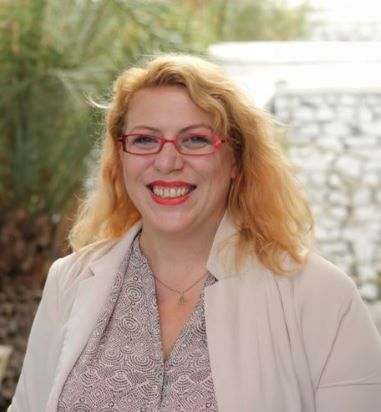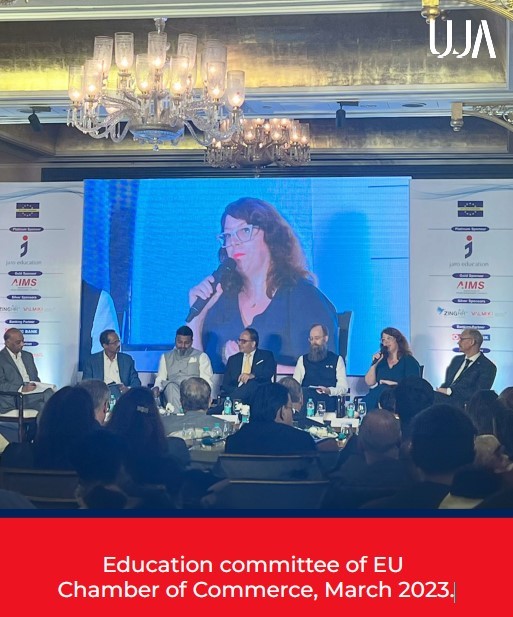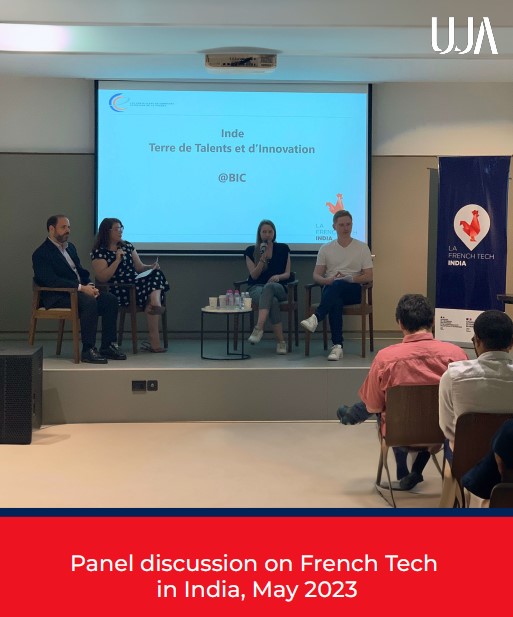Learn more about Maud Le Bars, South Asia Manager of Rennes School Business and CCE Inde - French Foreign Trade Advisor, shedding light on her enriching experiences working in India and on the Education and Research Collaboration between France and India.

South Asia Area Manager, Rennes School of Business France, and CCE India - French Foreign Trade Advisor based in Bangalore, India
Maud LE BARS: After working in HR for a FMCG group in Europe for a few years, I did a sabbatical that would culminate with 6 months of working holidays in New Zealand and was seeking a sunny and interesting place to travel before the end. I arrived in India and discovered Rajasthan. I immediately fell in love with the country. After 5 months, I continued with the intention to work in HR at Adecco in New Zealand for 6 months, but I soon realized that I was drawn to India. I looked for options, and tourism appeared to be an excellent way to begin a professional career in the country. After 6 months as a travel designer for a French India travel agency, I was promoted to HR Group Manager as the group grew within India and South Asia, opening 8 offices. I then had the chance to overtake a role as General Manager for India the year that agency obtained two prestigious awards for best travel agency for South Asia and best boutique travel agency in North India.
After over 4 years of bringing Europeans to India, I felt that a change was needed and that it was time for me to confront myself with the Indian clientele if I wished to stay in India long-term.
What better opportunity than working in higher education and promoting France and one of its excellent business schools to Indian students? I have been supporting the growth of Rennes SB in India and South Asia for the past 7 years, exponentially increasing the number of students from this region, and developing innovative university partnerships in various domains, including research.
I enjoy the talent, sense of humor, incredible creativity, and flexibility of Indians. I’m also amazed by the changes and progress that I see happening here.
Maud LE BARS: The French government has made it clear that India, and particularly student mobility with India, is strategic for the country. The objective is to create long-term and solid relations between our two countries. It has translated into strong promotion efforts from Campus France, and a significant number of French schools have followed, particularly business schools. Many of them have invested in building a representation bureau in India, resulting in a surge of applications. The success of the campaigns, the quality of the applicants, and the benefits offered to Indian students by the French government helped in keeping the interest of those schools.
Classic mobility, as well as direct recruitment, are increasing, though not to the level of our neighboring countries (Germany or the UK). We also saw a few French schools opening campuses in India, but unfortunately, there were a few difficulties, which we hope the NEP will help solve. However, for those who open a campus, the volume of applications in India means that there are real opportunities for quality education to succeed here.
Maud LE BARS:
Indian students have many options, and France has been late in promoting itself in comparison to some of its contenders. Now, the introduction of a 2-year post-study stay visa in 2016, followed by the presidential visit in 2018, where the 1st MOU of mutual recognition of degrees was signed by India, gave a strong push to the destination.
During the COVID-19 crisis, not many nations kept their doors open to international students; therefore, France, which was one of the few that did, had an opportunity to be considered by some of the elite students. It contributed to a more positive image of the location, which is still present now. The experiential learning style of studying with a yearly internship, as well as the fact that programs are ranked among the best in the world in many fields, particularly management, while keeping the cost reasonable, were also reasons for the recent success of France as a study destination.
The French schools are also very active in developing exchange programs with top institutes in India, which is quite unique. It is in fact mandatory in many schools in France for students to spend at least 1 semester abroad during their masters, unlike in many other countries.
However, we have seen a decrease in interest in Indian destinations among French youth. Symptomatic of this would be the fact that when India used to welcome 100 VIE a year, it stuck to 65 in 2023. French schools also have trouble maintaining reciprocity for exchange programs. Among the reasons is the fact that in 2013, it became difficult to pursue an internship in the country after an exchange, unlike many other destinations. Most young people came to work in NGOs, which were easier to find, and therefore mainly saw one aspect of India and not the modern one.
It would be, however, a high opening for them to experience a country that crossed 100 unicorns in 2022! Today, I can say that a French student who comes to India would then be a preferred candidate for the many VIE opportunities in India, among the more than 1000 French companies that have operations here. They would also have a chance to improve their English skills, as India is the 2nd country in the world for English speakers. They could study at some of the best and most selective institutes in the world while being part of one of the fastest-growing markets.
Maud LE BARS:
There are cultural differences between France and India. I personally believe that you learn first about your own biases and ways of thinking by working with people who think and behave differently. You become more aware, more agile, and more innovative in the process. In addition, India’s youth is soon to reach 25% of the global population of 15- to 24-year-olds. Indian professionals are already well represented in the leadership of many MNCs these days, but in a few years, wherever one will work, they are likely to be working with people of Indian origin. In this context, it would be very helpful for French students to learn how to work efficiently with Indian teams.
Maud LE BARS:
As France is present in India in so many sectors (it’s the 3rd foreign employer here), it’s difficult to narrow the answer down to one. IT, Finance, Industry, Supply Chain, Mobility, and Defense/Aero are sectors in which the need for skilled profiles is strong, along with a good capacity to work with both cultures. The French Tech, the start-up community in Tech backed by the French government, is celebrating its 10th anniversary here in 2023 and has created a lot of opportunities for young profiles.
More recently, the luxury sector has been developing in India, but there is no specific training available here when French schools have so much to offer in this field. This is one of the many sectors I can see developing between education and business.
Maud LE BARS:
Lately, the French Embassy has announced the creation of international classes where young students would be learning French and being prepared to join Bachelors in France more easily. This shall help foster further exchange.
Also, an Indo-French campus in the health sector is in development involving several Institutions of repute in both countries.
Maud LE BARS:
The main advice would be to come with an open mind and a lot of humor. It is important to build relations here and be flexible in the mode of delivery. You’d better be someone who is not averse to improvisation and a certain amount of uncertainty. You will have to learn not to take overenthusiasm for granted or as a sign of a lack of authenticity, and to have a very concrete and non-naïve approach to partnerships.
It’s quite difficult to put in a few words, but I think that some of the people I know who left India for more known destinations often told me they felt a bit too comfortable and bored there compared to their experience in India.


Maud LE BARS:
The main change I have seen among the Indian students lately has been a more optimistic approach to their future: they would be happy to have a 1st experience in Europe after their studies, but there’s an increasing number of them who are very happy to come back to India and become entrepreneurs or start with well-paid and very interesting roles.
Those students look at their studies abroad as a way to confront themselves with a different perspective so that they can bring new ideas and new methods back to India and contribute. We are also seeing fewer students choosing a bachelor’s or master’s under family pressure (though it still exists, of course), and therefore we have more informed and mature candidates who embrace their program instead of just trying to go through the semesters.
For more information on this portrait or on UJA contact olivia@uja.in
